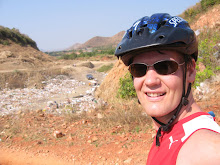This litterally is a peripheral blog -I almost missed this last assignment!
I am very excited to use some of the extra tech toys in next year's newly designed Rice Unit. Particularly the Flip Cam. It is really so easy to use, and so simple to incorporate into some many types of files and applications.
I've been using several differnt cameras and tools to tell stories in my I.T. class thus far, and have met with limited success. In part because of the nature of the sixth grade brain, but also in the defining of the parameters of the assignment.
In making a story with digital media, the story board needs to be used as an integral part of the process. I am sure that many of the mishaps with the peripheral devices could have been avoided if the students went in with a greater sense of purpose with them.
I will definintely take my own advice on this when building the documents and lessons for my final assessment. Thanks, Matt.
The International School of Prague (ISP) Elementary School English language
specialist (EAL) teachers and mainstream classroom teachers are
increasingly wo...




